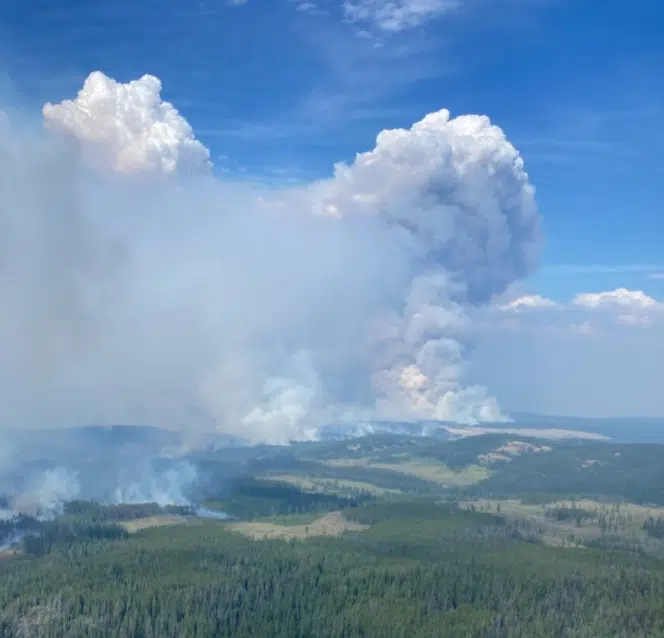
The Tremont Creek Fire as seen on July 17. Photo via BC Wildfire Service
The B.C. government will not be declaring a provincial state of emergency over wildfires after a request to do so was made by the Thompson-Nicola Regional District.
The TNRD board voted unanimously on Thursday to ask the province to make that declaration, reversing a decision from ten days earlier when the board voted not to ask for a provincial state of emergency.
In a letter sent to board chair Ken Gillis on Monday afternoon, B.C. Public Safety Minister Mike Farnworth said it is not necessary to make that declaration as there are enough resources from the federal government available to support evacuees and impacted areas.
“The powers currently available to local authorities and the province allow for necessary actions to be taken, such as evacuation orders, preventative measures and response efforts,” the letter said.
Farnworth said he fully recognizes the impacts that wildfires are having in the southern Interior, including places like Lytton, where two people were killed after most of the village burned down on June 30, adding he sympathizes with the people affected.
He reiterated a point he – and Premier John Horgan – have made on several occasions that the government “is prepared to declare a provincial state of emergency if the situation arises where officials deem it necessary.”
Like what was seen during the COVID-19 pandemic, a provincial state of emergency would give the B.C. government extraordinary powers for things like potential orders on travel bans within the province, rationing supplies, and fixing the price of goods and services.
Gillis, meanwhile, has said there isn’t room for evacuees to stay anywhere within an hour of Kamloops.
“I’ve had I don’t know how many people approach me and say ‘what in the world is wrong with the province? Why haven’t they declared a state of emergency?'” he told NL News on Thursday.
Last week, the BC Wildfire Service said it did not have enough resources to respond to all new wildfires that start.
“Which means our focus is on allocating those resources to values of life and safety. Crew safety will remain a top priority for our organization in these conditions; we are seeing fire behaviour that is extremely aggressive,” BCWS deputy director Kurtis Isfeld told a news conference on Thursday.
“The conditions, obviously, in British Columbia, are challenging. What we’re finding this year that sets it apart from previous years is that neighbouring jurisdictions are also encountering the same type of challenging conditions. In addition, COVID-19 has caused challenges with resource-exchange arrangements in some of those agencies.”
Australia and New Zealand have declined requests to send firefighting resources to B.C., because of COVID-19 concerns.
“We also work with California, Washington, and Oregon. We have not yet seen a significant number coming north and that’s a result of the fact that we’re in the same heat dome,” Premier Horgan said.
“We’re having the same challenges in our time zone as they are. I’m confident, based on briefings from the fire service, which I get daily, that we have the resources in place to do what we can, but more resources are not going to help unless we have all hands on deck, and that’s happening.”
As of Thursday, Isfeld said about 2,500 personnel were fighting fires in B.C., working with First Nations, municipal, and volunteer fire departments, members of the forest industry, and organizations like the BC Cattlemen’s Association. At that point, 118 out-of-province resources were on the ground, from places like Alberta, Manitoba, Quebec, New Brunswick, Nova Scotia, Newfoundland, and Parks Canada.
A team of about 50 military personnel are also stationed out of Kamloops to help fight wildfires. A team of 20 firefighters from Quebec arrived in B.C. on Friday, while another 100 firefighters from Mexico will be arriving on July 24.
They will be tested for COVID-19 before and after they arrive in Abbotsford.
As of Monday afternoon, there were 296 active wildfires in the province and 37 wildfires of note, leading to the evacuation of about 3,000 properties. As of end of day on July 18, 1,135 fires had burned more than 275,500 hectares of land since April 1; with more than 272,000 hectares burned in the past three weeks alone.















